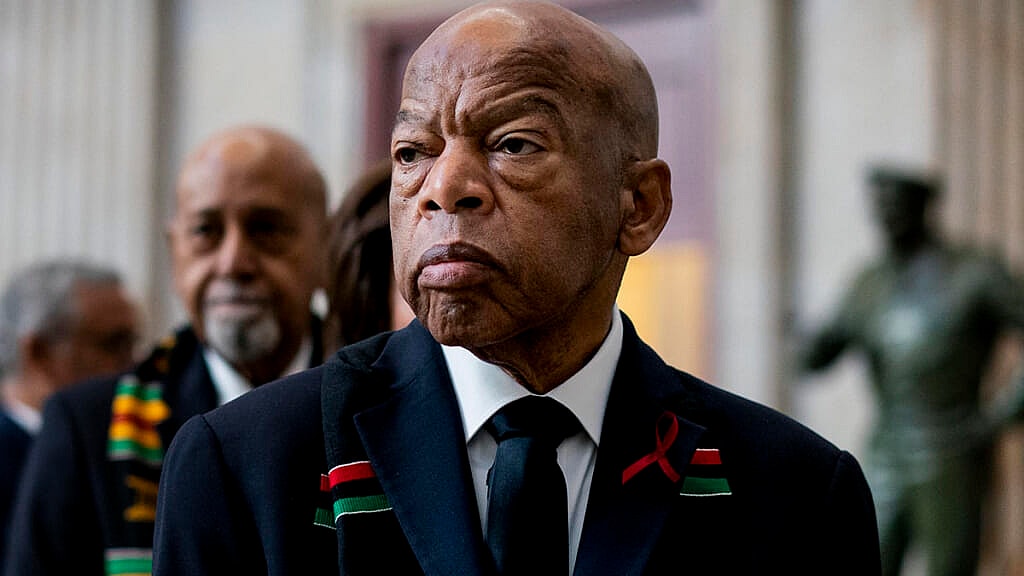Many are still mourning the loss of legendary freedom fighter Rep. John Lewis, who died in July at the age of 80, and thanks to Dawn Porter, he will be immortalized forever in her documentary, John Lewis: Good Trouble.
theGrio caught up with the film’s director, Porter, to find out how she handled the hero’s journey.
Read More: Rep. John Lewis, a civil rights icon, dies at 80

The film that follows Lewis’ extraordinary life and world-changing work premiered on streaming services just two weeks before his death and was broadcast on CNN in September. Fortunately, Lewis was able to see the film with Porter before he passed away.
“That was really special. He was not diagnosed before we finished the movie, so we had no idea. We were completely were done, completely edited. We had no idea he was even ill,” she explains.
“So we finished in November. We found that out he was sick in December. In February. I mean, there were still some hope that he could fly to Atlanta to do a screening. This was right when COVID hit, like a month before a shutdown. He was in treatment and not really up to traveling that weekend so I flew to D.C. from California and it was Valentine’s Day,” she recalls. “I just plucked open my laptop and we watched it together. He cried a little bit and then after he just kept saying, ‘it’s so powerful, it’s so powerful.'”

The incredible project features first-hand accounts from lewis himself, and incorporates footage from some of his most memorable speeches and events; painting a picture of a beautiful life lived in service to our community. Seeing Lewis’ story unfold is certainly inspiring, but it also highlights the fact that leaders aren’t as easy to identify in today’s fight for justice.
“That is what’s so remarkable about John Lewis and the other activists of the time; they were 18 and 19 and 20 years old. And with young women, there were 19 and 20,” says Porter. “I think we need different layers of leadership. We need governmental, we need activists who are seniors and we need activists who are young people. I think that there are a plethora of voices, but you do kind of need some coordination.”
“Even if those folks are trying to figure it out, I don’t feel like we have the place to look to. I’m like, all right, I’m primed now. Where do I go? Who do I listen to? Who’s trustworthy? I see that as an opportunity,” she continues. “One of the things I want to make clear in the movie is that John Lewis and the others didn’t just show up on a bridge. They planned for months and months. They studied. They agreed. They hashed out how they would do things so that they spoke with a voice that could be followed.”
Read More: Stacey Abrams doc ‘All In: The Fight for Democracy’ to open in theaters
For Porter, one of her favorite scenes in the film made a poignant point.
“One of the scenes that moves me the most is when they’re appearing in court and the announcer says each of them was given a choice: 30 days in jail or bail, and they all chose jail. That was a deliberate strategy. They knew if they were a core of people, you couldn’t ignore them. You also couldn’t kill them, so you couldn’t silence them,” Porter says.
She also highlighted the ways in which the fight has changed, offering some hope on how each of us can take it up in our own way.
“In some ways our expectations are greater. If you think about it, he was trying to have a hamburger and a Coke in a drugstore and vote. But really it was about really establishing the basic dignities of human life. Can I walk where I want? Can I go to school where I want? Can I live where I want? It’s not so easy to deny those basic dignities these days. The pressure point that we’re in now is pushing for real power,” Porter notes.
“I think that the fight has elevated. We are still making sure that enough people have the basic decency of life. That effort is not finished, sadly. But we’re also saying and we’re gonna be in some real power, too. He really straddled both of those efforts and he never forgot that. We need to remember that we could have a Black president. We could have Black multibillionaires and all the rest of it. That’s not enough. That was not John Lewis’s mission. His mission is how do we rise all boats? Particularly for Black and brown people, but for all marginalized people; and he always said that.”
John Lewis: Good Trouble is streaming now.
Have you subscribed to theGrio’s podcast “Dear Culture”? Download our newest episodes now!
TheGrio is now on Apple TV, Amazon Fire, and Roku. Download theGrio today!

